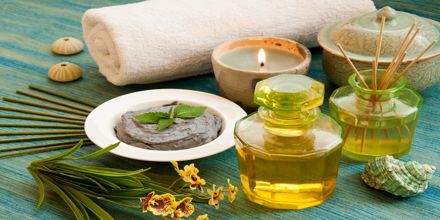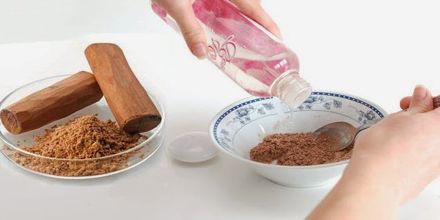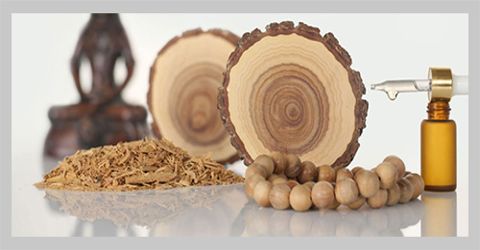Sandalwood oil is initiates in various perfumes and air fresheners. It’s a classic scent from a valuable tree. But the worth of sandalwood oil may go beyond smell. Sandalwood also has some health benefits as well. This oil is derived from the heartwood of the sandalwood, which is a heiparasitic evergreen that grows by joining the root system of other trees.
Sandalwood oil comes from the wood and roots of Santalum album, or the East Indian sandalwood tree. This is one of the most precious trees in the world. Its products are used transversely the globe. West Indian and African sandalwood oils have also been produced in the past, but they do no longer widely exist.
Sandalwood and its oil are prized in the field of alternative medicine. It’s traditionally used to treat a variety of conditions. Most of its traditional uses haven’t been scientifically tested, but some research suggests sandalwood may help treat certain health problems.

Traditionally use of Sandalwood
Sandalwood oil has a lot of traditional uses. For centuries, East Indian sandalwood oil has been a popular ingredient in Ayurvedic medicine, the folk medicine of India. It’s also been used in traditional Chinese medicine (TCM).
In these traditions, sandalwood oil has been used with other therapies to manage: the common cold, urinary tract infections, liver and gallbladder troubles, digestive troubles, muscle troubles, mental disorders, hemorrhoids etc.
Few of the traditional uses of sandalwood oil have been tested with present science. There is a deficient in of studies evaluating the health benefits of sandalwood. This is why scientific study on its health benefits is partial.
Sandalwood Can be used at Home
There are lots of ways to use sandalwood oil in aromatherapy at home. You can:
- apply it directly to your skin
- put a few drops in your lotion
- heat it in a small kettle of water to scent your home
- evaporate it using an essential oil infuser
- add it to your bath water
Some people have allergic reactions to essential oils. These reactions are uncommon. They most frequently occur when people apply essential oils directly to their skin. If you’re concerned about an allergic reaction, test a little amount of sandalwood oil mixed with a carrier oil or lotion on a small patch of your skin. Wait to see if you react before using larger amounts.

Benefits of Sandalwood Essential Oil
The health benefits of Sandalwood essential oil can be accredited to its properties as an antiseptic, anti-inflammatory, antiphlogistic, antispasmodic, astringent, carminative, diuretic, disinfectant, emollient, expectorant, memory booster, sedative and tonic substance. Sandalwood essential oil can help you attain more precision and quietness due to its wide therapeutic benefits. This particular essential oil doesn’t just have an amazing scent, sandalwood can also have an effect on general well-being and mental health, along with many other amazing healing properties.
Mental clarity: One of the major sandalwood benefits that it promotes mental clarity when used as an incense or fragrance. This is why it is regularly used for meditation, prayer, or other saintly rituals.
Memory booster: Since one of sandalwood’s benefits is clarity, it also cans exertion as a memory booster. It is hard to keep in mind significant things when we are plagued and strained out, therefore using sandalwood oil to promote mental clarity can help develop memory.
Natural aphrodisiac: Sandalwood is also an aphrodisiac that can facilitate increase libido, particularly for men and make available energy. Sandalwood is great when added to a massage oil or topical lotion.
Anti-aging: Sandalwood is high in antioxidants that can help decrease damage caused by free radicals, which promote aging. Try adding 5 drops of sandalwood oil to an unscented lotion and applying it directly to the face for anti-aging benefits

Sandalwood Essential Oil Side Effects
Sandalwood oil is in general safe for use, but there are warnings and precautions. There are no key reported side effects to the use of sandalwood. Some people may experience slight skin impatience from its use. People with ruthless allergies or pregnant should also be careful before trying any type of aromatherapy.
As with any essential oil, a small test patch should be applied to the skin first before using it all over. Sandalwood oil is in general not applied directly to the skin, but is regularly mixed with a carrier oil or lotion first to dilute it. Common carrier oils include: almond oil, jojoba oil, or grape seed oil. Breastfeeding mothers and young children should evade using sandalwood oil. Moreover, the oil may cause an allergic skin reaction in assured individuals, so it is vital to test it on a small area of skin first. Those who experience from some type of medical situation, such as liver disorder and cancer, should also take additional precaution using the oil in aromatherapy.
In Summary
- Sandalwood oil, usually found in perfumes and air fresheners, may help promote alertness, relieve anxiety, and prevent skin cancer.
- For centuries, East Indian sandalwood oil has been a well-liked ingredient in Ayurvedic medicine, the folk medicine of India. It’s also been used in traditional Chinese medicine (TCM).
- Some studies have supported the idea that sandalwood has health perks.
















